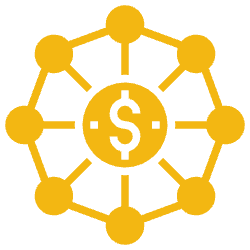Blockchain technology, often hailed as a revolutionary innovation, has transcended its origins in cryptocurrency and is now poised to transform various industries. Among its many applications, one of the most significant is its role in ensuring data security and privacy. In this article, we’ll delve into the intricacies of blockchain technology and explore how it safeguards sensitive information in the digital age.
1. Introduction
In an era where data breaches and cyber threats loom large, the need for robust security measures has never been greater. Traditional methods of securing data, such as centralized servers and passwords, have proven to be vulnerable to attacks. This is where blockchain comes into play, offering a decentralized and immutable solution to the age-old problem of data security.
2. Understanding Blockchain
2.1 What is Blockchain?
At its core, blockchain is a distributed ledger technology that records transactions across a network of computers. Unlike centralized databases, which are controlled by a single entity, blockchain operates on a decentralized network, making it resistant to tampering and fraud.
2.2 How Blockchain Works
Each block in the blockchain contains a cryptographic hash of the previous block, along with transaction data. Once a block is added to the chain, it becomes immutable, meaning it cannot be altered or deleted. This transparency and immutability are what make blockchain an ideal solution for securing sensitive data.
3. Importance of Data Security and Privacy
3.1 Why Data Security Matters
Data security is paramount in today’s digital landscape, where a single breach can have far-reaching consequences. Whether it’s personal information, financial data, or intellectual property, organizations and individuals alike rely on secure systems to protect their assets from unauthorized access.
3.2 The Importance of Privacy
In addition to security, privacy is another critical aspect of data protection. With the increasing prevalence of surveillance and data mining, individuals are becoming more conscious of their right to privacy. Blockchain technology offers a solution by enabling anonymous transactions and decentralized storage of data.
4. Blockchain and Data Security
4.1 How Blockchain Ensures Security
One of the key features of blockchain is its consensus mechanism, which requires majority agreement among network participants before a transaction can be validated. This decentralized validation process makes it virtually impossible for malicious actors to alter the data stored on the blockchain.
4.2 Advantages of Using Blockchain for Data Security
Beyond its inherent security features, blockchain offers several advantages for safeguarding data. These include transparency, traceability, and resilience against cyber attacks. By eliminating single points of failure and distributing data across a network of nodes, blockchain reduces the risk of data breaches and ensures data integrity.
5. Blockchain and Privacy
5.1 How Blockchain Enhances Privacy
In addition to security, blockchain enhances privacy by allowing users to transact anonymously without revealing their identity. By encrypting data and providing pseudonymous identities, blockchain protects sensitive information from prying eyes and unauthorized access.
5.2 Use Cases of Blockchain in Ensuring Privacy
Blockchain has a wide range of applications in safeguarding privacy, from secure messaging platforms to identity verification systems. By leveraging cryptographic techniques and decentralized networks, blockchain enables users to maintain control over their personal data and protect their privacy rights.
6. Challenges and Limitations
6.1 Scalability Issues
Despite its many benefits, blockchain still faces scalability challenges, particularly when it comes to processing large volumes of transactions. The time and energy required to validate transactions can hinder the scalability of blockchain networks, posing a barrier to widespread adoption.
6.2 Regulatory Concerns
Another hurdle facing blockchain adoption is regulatory uncertainty. As governments grapple with the implications of blockchain technology, there is a need for clear guidelines and regulations to ensure compliance and protect consumer rights.
7. Future of Blockchain in Data Security and Privacy
7.1 Emerging Trends
Despite these challenges, the future looks promising for blockchain technology. Innovations such as sharding, sidechains, and layer 2 solutions are addressing scalability issues and expanding the capabilities of blockchain networks.
7.2 Potential Impact
As blockchain continues to evolve, its impact on data security and privacy will only grow stronger. From secure supply chains to digital identities, blockchain has the potential to revolutionize how we store, manage, and protect sensitive information.
8. Conclusion
In conclusion, blockchain technology offers a revolutionary solution to the pressing challenges of data security and privacy. By providing a decentralized and immutable ledger, blockchain ensures the integrity and confidentiality of sensitive information in an increasingly digital world.
9. FAQs
Q1: Is blockchain technology only used for cryptocurrencies?
A1: No, blockchain technology has far-reaching applications beyond cryptocurrencies, including data security, supply chain management, and identity verification.
Q2: Is blockchain completely secure and unhackable?
A2: While blockchain offers robust security features, it is not immune to attacks. However, its decentralized nature makes it significantly more secure than traditional centralized systems.
Q3: Can blockchain technology be regulated by governments?
A3: Yes, governments can regulate blockchain technology through legislation and regulatory frameworks. However, striking a balance between innovation and regulation is essential to foster blockchain adoption.
Q4: How does blockchain ensure privacy?
A4: Blockchain enhances privacy by encrypting data, providing pseudonymous identities, and enabling anonymous transactions, thereby protecting sensitive information from unauthorized access.
Q5: What are some real-world examples of blockchain applications in data security and privacy?
A5: Examples include secure messaging platforms, digital identity systems, and decentralized finance (DeFi) protocols, all of which leverage blockchain technology to enhance data security and privacy.

